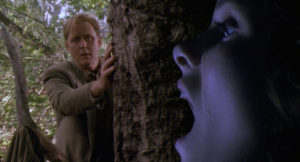 Review: One Night Only
Review: One Night Only
Raising Cain | Brian De Palma | USA | 1992 | 95 minutes
UW Cinematheque, 4070 Vilas Hall, Friday, September 9, 8:45pm»
Erik Oliver suggests that despite having characteristics of Brian De Palma’s better films, Raising Cain also indulges his worst tendencies as he fails to transform its pulpy material.
Raising Cain is schlock.
It’s also a movie by Brian De Palma: great artist, expert craftsman, and shameless schlockmeister. Schlock is not just a characteristic of his films, but a key to their success. De Palma can transform schlock. He thrives on taking broad, pulpy stories, injecting them with a keen, cinematic self-awareness, and elevating them to rhapsodic opuses. He dives into the depths of the American id and takes us with him.
Raising Cain is as formidable a stew of pulp tropes as you’ll find in De Palma’s filmography, but it ultimately fails to make anything of them, falling instead into misjudged mediocrity.
Child psychologist Carter Nix (John Lithgow, in one of several roles) offers a fellow parent a ride home from a playground. He describes a scientific program run by his father, Dr. Nix, which is meant to run experiments on gifted children. She is appalled by his suggestion that she enroll her infant son, so he knocks her out and steals her child. His twin brother, Cain, evil because he’s also played by John Lithgow but wears sunglasses, promises to clean up the mess. Meanwhile, Carter’s wife Jenny (Lolita Davidovich) worries about her husband’s unusual interest in their daughter.
 Cain’s main point of interest is its approach to rolling out information in its first act. There’s a long stretch during which it’s nearly impossible to tell when its characters are dreaming, fantasizing, or acting in reality. While stylistically interesting, it makes it difficult to discern the story’s main conflict, especially as it begins to thread subplots that eventually become crucial but initially seem haphazard. Perhaps intended as a way to represent Cain’s protagonists’ scattered and damaged mental states, it instead serves mostly as a way to add shocks when the seams between reality and fantasy become clear, and to add nonlinearity to a story that would be soapy and dull if played straight.
Cain’s main point of interest is its approach to rolling out information in its first act. There’s a long stretch during which it’s nearly impossible to tell when its characters are dreaming, fantasizing, or acting in reality. While stylistically interesting, it makes it difficult to discern the story’s main conflict, especially as it begins to thread subplots that eventually become crucial but initially seem haphazard. Perhaps intended as a way to represent Cain’s protagonists’ scattered and damaged mental states, it instead serves mostly as a way to add shocks when the seams between reality and fantasy become clear, and to add nonlinearity to a story that would be soapy and dull if played straight.
Eventually, Cain settles into a more straightforward thriller story, finally integrating its many threads, but De Palma’s signature use of previous films’ storytelling techniques becomes distracting and muddled. Cain riffs most noticeably on two of Psycho’s most famous moments, stretching them to their breaking points in new contexts, but without as finely-tuned a grasp on audience reactions as De Palma is capable of. Moments that should shock or challenge our sympathies instead just fire synapses to trigger memories of earlier movies and fail to play with tropes meaningfully.
De Palma also takes Psycho’s famously slippery psychology as an ethos. Cain’s weak grasp of mental illness has none of the allure or filmmaking bravado that carried the uglier Dressed to Kill. Resting the story on stock tropes of personality disorders and murderous split personalities, De Palma revels in his usual bad taste, but to overly familiar effect. The result is a disappointingly flat movie built on ostensibly shocking elements, by a director who’s usually fascinating.
As usual for De Palma, Cain plays with taboos—notably endangered children and the slippery sympathies of an affair—but it comes off as both exploitative and strangely uninterested in its darker areas. Little is made of its abduction story, except as an impetus for its adult characters to take action against one another. The plot’s twists are so convoluted and poorly set up that the third act plays as more rote and confusing than unhinged. Even the film’s climax, which is impressively staged through three tiers of action, rests on wonky stakes and ludicrous plotting.
De Palma movies hardly hinge on psychological realism or nuanced performances, but in his best films, the actors can hit a kind of operatic impressionism that befits the frenzied plots. Lithgow can do unhinged in his sleep. The problem is that in Cain, he does. He has the showiest part, playing several roles, but he gives none of them anything more than lukewarm campiness, which contributes to the flatness of the movie’s conflict. He’s fun, in a way. Relying on simplistic mannerisms rather than genuine menace or functioning psychology, he, too, is slumming it. Davidovich gives a fairly rote performance, lending little depth to a thinly sketched character. Much of the film’s peril would, in theory, rely on her ability to sell her concern about her daughter, but she gives barely more than required.
Ultimately, Raising Cain is De Palma by numbers, showcasing few of his trademark stylistic flourishes, and indulging his worst tendencies without the meta perverse fascination he usually delivers.